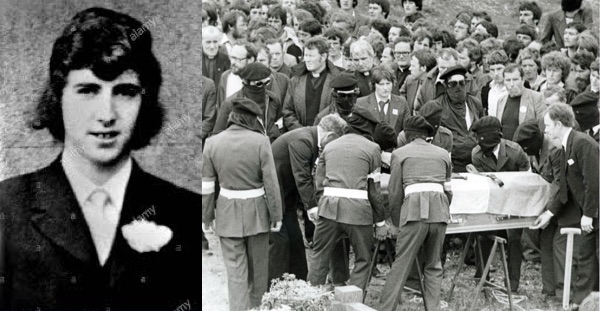
A brief look at the life of Martin Hurson, who fought for Irish freedom and became the sixth to die in the 1981 hunger strike, 37 years ago this week.
Edward Martin Hurson was born on September 12th, 1956, in the townland of Aughnaskea, Cappagh, near Dungannon, the eighth of nine children: six girls and three boys.
Both of his parents, John, a small hill farmer, and Mary Ann (whose maiden name was Gillespie) came from the Cappagh district, and the whole of their family were born into the white-washed farmhouse perched precipitously on top of the thirty hilly acres of rough land. Martin was close to the land as he grew up.
Although he first went to Crosscavanagh school in Galbally, and then to St Patrick’s intermediate in Dungannon, when he was not at school he was more often than not helping out about the farm, driving a tractor, helping to rear ‘croppy pigs’ or looking after cattle.
Leaving school, Martin started work as an apprentice fitter welder at Findlay’s. He worked in Manchester for about 18 months before returning home around Christmas 1974. He worked then for Powerscreen International in Dungannon and started going out with Bernadette Donnelly in 1975.
Martin was arrested and taken to Omagh RUC barracks on November 11, 1976, along with six others arrested that day and two days previously. He was beaten about the head, back and testicles, spread-eagled against a wall and across a table, slapped, punched and kicked.
He heard James Rafferty’s screams as he was tortured in the adjoining room. Under torture Martin signed statements admitting involvement in republican activity. On Saturday night, November 13, Martin was charged with a landmine explosion at Galbally in November 1975.
This charge was later dropped, but he was then further charged with IRA membership and explosive offences. Martin spent a year on remand before being convicted in November 1977. He was sentenced to 20 years for possession of landmines and conspiracy. Martin appealed his conviction on the grounds that the judge had ignored medical evidence about his ill-treatment.
The appeal was dismissed but he was granted a retrial. At the four-day trial in September 1979, before Judge Murray, the Omagh statements were ruled inadmissible, but instead of Martin walking free the judge went on to accept the admissibility of the Cookstown statements, themselves extracted under threat of renewed torture. Martin Hurson went straight on the blanket after his first trial, and following his retrial he appealed once again against conviction, challenging the admissibility of the Cookstown statements, but his appeal was disallowed in June 1980.
On May 29, 1981, Martin joined the hunger-strike, replacing South Derryman Brendan McLoughlin who was forced to drop out because of a burst stomach ulcer. Having seriously deteriorated after forty days on hunger-strike, he was unable to hold down water and died a horrifically agonising death after only forty-four days on hunger-strike, at 4.30am on Monday, July 13th.
![[Irish Republican News]](https://republican-news.org/graphics/title_gifs/rn.gif)
![[Irish Republican News]](https://republican-news.org/graphics/title_gifs/harp.gif)

